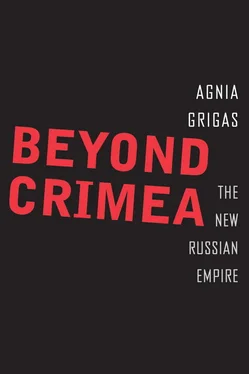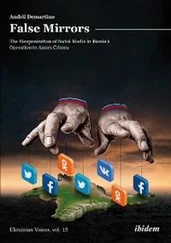Russian compatriots not only figure in all stages of the reimperialization trajectory, they are the driving force behind it. For instance, Russia’s soft power over neighboring states stems in great part from the presence of the sizable Russian and Russian-speaking minorities. At the same time, Moscow’s work to maintain soft power over those minorities in some ways precludes their successful integration into their states of residence while the perceived grievances of Russian compatriots enables Russia to engage in human rights efforts. These grievances, termed “human rights abuses” are then used as a pretext in subsequent stages of passportization, support for separatist movements, and finally efforts at protection and usurpation of territories. As the case studies will demonstrate, the human rights abuses endured by Russian compatriots are often blatantly invented, and certainly their claims are disseminated to exacerbate tensions in neighboring states via Russian information warfare campaigns. In the final stages of Moscow’s reimperialization trajectory, as in the cases of South Ossetia, Abkhazia, and Crimea, compatriot protection is given as a reason for Russia’s military intervention.
The complex interlinkage of the compatriot issue with Russia’s other tools and goals of foreign policy can be seen in the various strategic government bodies that oversee and fund the compatriot policy, including the ministries of Foreign Affairs, Culture, and Education. However, possibly the most important federal institution in this area has been the Federal Agency for Commonwealth of Independent States Affairs, Compatriots Living Abroad, and International Humanitarian Cooperation (known for short as Rossotrudnichestvo). This agency was established with the explicit aim of “maintaining Russia’s influence in the Commonwealth of Independent States, and to foster friendly ties for the advancement of Russia’s political and economic interests in foreign states.” 50Rossotrudnichestvo may well constitute one of the most ambitious instruments to advance Russian interests abroad: since its establishment in 2008 it has rapidly expanded opening 93 branch offices in 80 countries. 51In 2013 President Putin signed an order to increase the agency’s budget from 2 billion rubles (approximately $37 million) to 9.5 billion rubles (approximately $174 million) by 2020, thus making it one of the most expensive instruments of support for compatriots abroad. 52
Regional, local, and federal government institutions have also worked to execute Russia’s compatriot policies. From the late 1990s to late 2000s, the Moscow City Council and Yuri Luzhkov, the longtime mayor of Moscow (1992–2010), were prominent supporters of compatriot policies. During Luzhkov’s tenure as mayor, he reportedly spent hundreds of millions of dollars from Moscow’s well-padded city budget in the near abroad. 53Among other initiatives, he founded so-called Luzhkov scholarships for ethnic Russian students from post-Soviet countries (in parallel with scholarships from the Russian Ministry of Education). In 2003, the City of Moscow also launched its own compatriot policy via its Department for Foreign Economic Activity and International Relations. 54These policies included programs such as political and economic assistance to compatriots in Crimea, while also supporting the populace of the peninsula in gaining greater political autonomy from Kiev. 55
Funds for various compatriot causes are allocated simultaneously through a large variety of government organizations and programs. For instance, in 2011 the Ministry of Foreign Affairs allocated 400 million rubles (approximately $14 million) annually for the compatriot policy through its embassies. 56At the same time, the Ministry of Science and Education agreed on a 2011–15 budget for the Russian Language Program of 2.5 billion rubles (approximately $88 million). 57In May 2011, President Medvedev announced the creation of the Foundation for Supporting and Protecting the Rights of Compatriots Living Abroad, under the auspices of the Foreign Ministry to be a “permanent, systemic and effective system to protect the interests of our compatriots.” 58The Fund’s official purpose was to “render legal and organizational assistance to compatriots whose rights are violated abroad…. The new organization will also monitor violations of their rights.” 59The foundation has allegedly been involved in helping finance separatist and militia groups in eastern Ukraine. In May 2014 the Ukrainian security services confiscated the bank accounts of a Ukrainian organization Dar Zhizhni (Gift of Life) that in April 2014 received 8 million rubles (approximately $250,000) from the foundation, and according to a Ukrainian court decision had been using the funds to provide financial and media support to extremists in the Donbas to advance separatism and pro-Russian propaganda. 60
Moscow also institutionalizes the compatriots through various other cultural organizations, including the Russkiy Mir Foundation and the Russkiy Dom network. Throughout the 2000s the ideological concept of the “Russian World” gained strength on the back of Russkiy Dom, which was established in 1999 to promote Russian values, language, and culture as well as offering legal protection to Russians. 61By 2011 Russkiy Dom’s annual budget was some $30 million, with over fifty centers across the globe, including such disparate countries as Germany, Latvia, the United States, Switzerland, and Mexico. 62Likewise, Russia lends support to various transnational movements and organizations of the post-Soviet space that have historical or cultural ties to Russia and are deemed to be part of the Russian World. One example is the Cossacks, an East Slavic people with strong military and Orthodox Christian traditions living across Russia, Ukraine, the Caucasus, Central Asia, and beyond. They have enjoyed Moscow’s political, financial, and even military support for their separatist movements and have fought on the Russian side in the wars of Transnistria, Georgia, and most recently Ukraine where they have formed a short-lived and self-proclaimed separatist Cossack People’s Republic in the east of the country, which eventually was liquidated and incorporated into the Luhansk People’s Republic. 63
Russia also organizes large-scale events for its compatriots, such as the World Congress of Russian Compatriots, held in Russia every three years since 2003, where representatives from post-Soviet countries meet in a forum with the Russian president and other state leaders. Topics of discussion range from minority rights, resettlement back to Russia, to preservation of cultural and linguistic ties with the motherland. 64In some ways the congress is reminiscent of the early Soviet Comintern, or Communist International, which in the 1920s and 1930s held World Congresses in Moscow where representatives from international and European communist parties would meet. The Comintern was a tool of Soviet foreign policy, and the Kremlin held a disproportionate power share in the congresses which it used to promote its revolutionary ideals while expecting the foreign participants to declare loyalty to Moscow rather than to their home countries. 65Likewise, Russian compatriot representatives are expected to agree loyally with the policies outlined in the Kremlin, while they have limited ability to shape compatriot policy. 66According to participants, Russian embassies, which aid the recruitment processes, provide advance instructions to compatriots on what to do and what not to do at the congresses. 67It is no surprise that reports have cited a decline in compatriot participation at the World Congress meetings from around a thousand in 2009 to slightly over five hundred in 2012. 68Nonetheless, what is most concerning for post-Soviet states (and will be outlined in detail in the case study chapters) is the fact that compatriot organizations encourage the diaspora to make political demands such as changes in language and citizenship policies and calls for regional separatism and autonomy, as well as disseminating specific historical interpretations that split societies along ethnic lines.
Читать дальше












